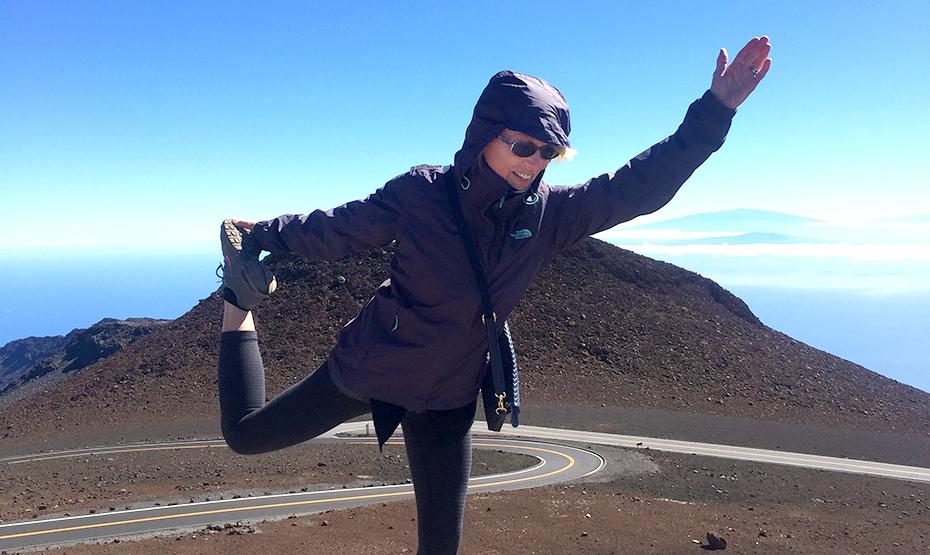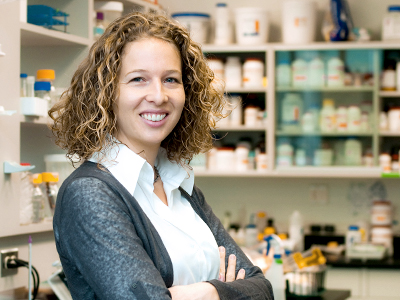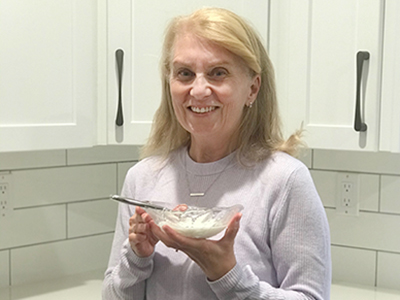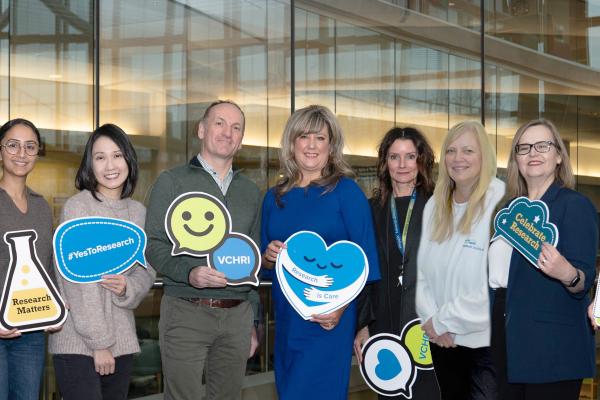
"I say yes to participating in research because I want to give back and be a part of research that helps people.”
– Wendy Harris, Mission
For 57-year-old Mission resident Wendy Harris, being healthy and health conscious is a way of life. Harris runs her own leisure-programming and fitness instructor training business—she knows the importance of good nutrition. So, when she saw an ad for a study requiring participants to eat yogurt, a food Harris regularly enjoys, she happily signed up. “I had already done two other research studies and enjoyed the experience. This vitamin-enhanced yogurt study sounded really interesting.”
“I love yogurt, so this study was perfect fit for me!”
Harris is one of 80 people ages 50-75 taking part in the study, which tests the potential benefits of fortifying yogurt with vitamin B12. The study is a Master’s project for University of British Columbia (UBC) student Larisse Melo and is being overseen by Vancouver Coastal Health Research Institute scientist Dr. Yvonne Lamers. “B12 is an essential nutrient across the life span—for healthy cell formation, optimal brain and nerve function and cognitive development,” says Lamers. “In later life, lower B12 levels are associated with cognitive decline and other neurological problems, so it’s vital to make sure our bodies get enough of it.”

Melo and Lamers are focussing on older adults because they are more vulnerable to B12 deficiency. As people age, their ability to digest and absorb B12 may decrease. Supplements in the form of oral pills or intermuscular injection are one option, but Lamers says providing B12 in a fortified food may be a more effective approach as it is a passive strategy and may allow for better absorption. “B12 is naturally occurring in animal products such as meat and dairy. Yogurt is a good option for fortification for a number of reasons. We can regulate the storage temperature, we can offer it to vegetarians, it’s a food many people like and it’s easy to consume.”

In the first part of the study, Melo worked in the UBC Nutritional Biomarker Laboratory and UBC Food, Nutrition and Health Pilot Plant to develop a fortified yogurt product. She tested whether it was better to add the B12 before or after fermentation, and whether B12 would be stable throughout the yogurt shelf-life. Melo then handed production over to a local dairy and began recruiting participants. “We gave half of the participants fortified yogurt and half regular yogurt. We tested B12 levels at the outset, midpoint and after the study ended to determine if the fortified version affected the participants’ vitamin levels. All our participants were asked to keep a food diary and, most importantly, eat yogurt every day for eight weeks.”
A taste of mystery
Did Harris ever tire of eating yogurt? “I definitely needed to mix it up a bit,” she laughs. “I added different fruit and granola or made smoothies. But it was delicious yogurt, with a yummy coconut flavor. And, I still love yogurt. In fact, some days I even ate other yogurt too!”

The research team made each visit so easy. I felt like I was taking part in something important.
Melo and Lamers will have results of the study in 2020. They’ll then leave it up to dairy producers and regulators to decide if B12 fortified yogurt is worth bringing to market. Their study was partly funded by the Dairy Farmers of Canada.
As for Harris, she’s keen to take part in more studies, even if they don’t come with a daily food reward. “I’d say to others, definitely take part in research! It’s worth your time. It’s interesting and you feel like you are giving back to the community.”
Visit Participate in Research to learn more about taking part in research as a healthy participant.
THIS IS ONE PATIENT’S STORY OF PARTICIPATING IN A CLINICAL TRIAL. YOUR EXPERIENCE MAY DIFFER. LEARN MORE ABOUT CLINICAL TRIALS BEFORE PARTICIPATING.


